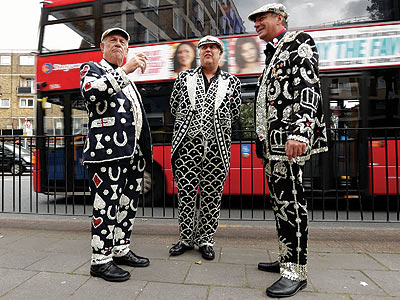
It's a safe bet that some 200 countries and regions competing in the London Olympics are represented in the British capital.
保守地说,有来自200多个国家和地区的代表团在本届伦敦奥运会上一决胜负。
But who will represent London? One of the city's oldest and signature communities is trying not to get lost in the *clamor.
但是谁能代表伦敦呢?整个城市中最古老和最具代表性的群体正试图在喧嚣中表明自己的地位。
Cockneys have been proud residents of London's East End for centuries – and they want to make sure the world knows it.
考克尼人是多个世纪以来自豪的伦敦东区市民¬——并且他们想要全世界都知道这一点。
Traditionally, a Cockney is anyone "born within the sound of Bow bells" – the bells of St Mary-le-Bow church in the heart of medieval London. It's usually taken to mean a working-class native Londoner.
在传统意义上,考克尼人指的是"出生时能听到圣玛丽-勒-波教堂钟声的人"——该教堂位于中世纪时伦敦的中心地带。它通常泛指土生土长的东伦敦区工人。
Cockneys speak in a distinctive accent. East Enders, as they are often called, use a distinctive form of rhyming slang, in which "would you believe it" becomes "would you Adam and Eve it?"
考克尼人的口音与众不同。人们常常称他们为"伦敦东区人",他们使用独特的同韵俚语(同韵俚语使用一个与单词押韵的短语代替这个单词)。比如把"would you believe it(你相信吗?)"说成"would you Adam and Eve it("Adam and Eve"是伦敦东部地区的押韵俚语,与"believe"是相同意思。)
Pearlies
盛装的伦敦小贩
Flamboyantly dressed figures with their black costumes covered in thousands of pearl buttons - does that ring a bell?
这些身穿缀满珠母纽扣的黑色服饰、盛装打扮的小贩,是不是让你觉得很熟悉?
They are probably among the most recognizable Cockney symbols – the so-called Cockney royalty: Pearly Kings and Queens.
他们或许是最鲜明的考克尼象征之一——这就是所谓的"考克尼皇室":珠母纽王和王后。
Organized by local officials before the Olympics, these "Kings and Queens" met journalists and guests in an East End pub to help raise some awareness for the Cockney culture.
奥运会开幕之前,在当地官员的组织下,这些"国王和王后"们在东区的一家酒吧里同诸位记者和来客见面,借此让人们了解考克尼文化。
The "pearlies" have their origins a century ago in a street sweeper named Henry Croft, who adapted the button-festooned clothes worn by London apple-sellers to help draw attention to his charity *fundraising.
这些"穿着缀满珠母纽扣节日盛装的伦敦小贩"的历史可以追溯到一个世纪之前,那时有位名叫亨利•克罗夫特的清洁工。他将伦敦苹果商贩所穿的以纽扣镶边的服装加以改造,以吸引人们来参加他的募捐活动。
Today, pearlies across London elaborately decorate hand-sewn outfits to raise money for charity. Many pass their honorary Cockney titles on from parent to child. But they worry their traditions may soon be lost.
如今,为了筹钱做慈善,整个伦敦的盛装小贩精心装饰着一件件手工缝制的服装。许多小贩将这种象征荣誉的考克尼人头衔传给下一代。但他们还是担心这种传统文化不久将消亡。
"We are dying out," said Jimmy Jukes, the Pearly King of Bermondsey and Camberwell in south London. "A lot of people think we're just about fancy dress."
"我们这种传统濒临衰退,"来自伦敦南部坎伯威尔和柏孟塞区的"珠母纽王"吉米•朱克思如是说。"很多人认为我们只是喜欢穿着花哨罢了。"
Changing times
时代在变
Some believe the distinctive Cockney brand of English is also in danger of dying out. In today's East End, the children of immigrants speak with Cockney accents, but their slang is as likely to come from American *jargon.
有些人相信,与众不同的考克尼英语也面临着消亡的危险。在如今的伦敦东区,虽然外来移民家庭的孩子说的是考克尼口音,但是他们说的俚语可能来自美国方言。
Yet most Londoners recognize that "apples and pears" is a slang for stairs or "trouble and strife" means wife, even if they wouldn't use the expressions themselves.
然而大多数的伦敦人还是能够辨别出俚语"苹果和梨"指的是楼梯(编辑注:pears和stairs押韵),"麻烦和冲突"指的是妻子(编辑注:strife和wife押韵),尽管他们自己可能不会使用这些表达。
But don't count the Cockneys out just yet. This is a community that's proud of its resilience. East Enders, after all, withstood the bulk of wartime bombing and personify Britain's "Blitz Spirit".
但是,不要忽视考克尼人。这是一个以坚韧为荣的群体。毕竟这些伦敦东区人经受住了战火的考验,而且赋予了大不列颠的"闪电战精神"。
Local resident Vicky Groves hopes to share that culture with the world during the Summer Games.
作为土生土长的考克尼人,维奇•格洛夫斯希望借夏季奥运会之机,与全世界分享考克尼文化。
"All eyes are on London," she said. "I think it's great to be able to say, we've got traditions that go back hundreds of years."
"全世界都注视着伦敦,"她说。"我们有着几百年的传统,我想这样向世界宣告是再合适不过的了。"












